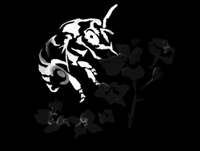Wild Pollinators
Wild pollinators are usually present anywhere there are insect-pollinated flowers. In the United States, the value of wild pollinator services has been estimated at $3 billion dollars per year.
The services of wild pollinators are free, and their numbers can be encouraged with low-cost measures to improve nesting habitat and the availability of non-crop food resources. A growing number of producers, especially in organic operations, are choosing to encourage wild pollinators on their land.
The benefits of wild pollinator conservation are twofold. First, the grower gains the services of a diverse array of pollinators on the crop at no (or relatively little) financial cost. The second benefit is to the vast array of wild plants in our wider ecosystem that provide us with vital ecological services (e.g., clean air, water) – many of these plants rely on wild pollinators to reproduce.
Bees & Wasps (Order: Hymenoptera)
Butterflies and Moths (Order: Lepidoptera)
See also Pollination & Agricultural Conservation in Useful Links.
References
Losey, J.E. & Vaughan, M. 2006. The economic value of ecological services provided by insects. BioScience 56:311-323.
